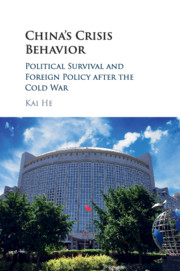Crossref Citations
This Book has been
cited by the following publications. This list is generated based on data provided by Crossref.
2016.
Books Received.
The China Quarterly,
Vol. 227,
Issue. ,
p.
854.
Kwa, Chong Guan
2017.
Perspectives on Military Intelligence from the First World War to Mali.
p.
97.
Gill, Bates
2017.
China’s future under Xi Jinping: challenges ahead.
Political Science,
Vol. 69,
Issue. 1,
p.
1.
He, Kai
and
Chan, Steve
2018.
Thinking about Change: American Theorizing and Chinese Reasoning on World Politics.
International Studies Review,
Vol. 20,
Issue. 2,
p.
326.
Feng, Huiyun
and
He, Kai
2018.
Prospect theory, operational code analysis, and risk-taking behaviour: a new model of China’s crisis behaviour.
Contemporary Politics,
Vol. 24,
Issue. 2,
p.
173.
Feng, Huiyun
and
He, Kai
2018.
Regional Powers and Contested Leadership.
p.
165.
Li, Mingjiang
2019.
Hainan Province in China’s South China Sea Policy: What Role Does the Local Government Play?.
Asian Politics & Policy,
Vol. 11,
Issue. 4,
p.
623.
Liu, Feng
and
Liu, Ruonan
2019.
China, the United States, and order transition in East Asia: An economy-security Nexus approach.
The Pacific Review,
Vol. 32,
Issue. 6,
p.
972.
Kim, Hyung Min
Woo, Jungmoo
and
Lee, Jae Chul
2020.
What Is the Relationship Between Alliance and Militarized Conflict? Analysis of Reciprocal Causation.
Armed Forces & Society,
Vol. 46,
Issue. 4,
p.
539.
Kim, Young-Chan
2022.
China and the Belt and Road Initiative.
p.
55.
He, Kai
and
Feng, Huiyun
2023.
After Hedging.
Lian, Chenchao
and
Wang, Jianing
2023.
Embrace or repress? Explaining China’s responses to nationalism in international incidents.
The Pacific Review,
p.
1.





